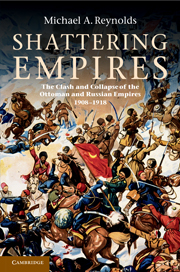Book contents
- Frontmatter
- Contents
- List of plates
- List of maps
- Note on transliteration and usage
- Acknowledgments
- List of abbreviations
- 1 Dismemberment of the Ottoman empire, 1878–1913
- 2 Eastern Anatolia and the Caucasus, 1914
- 3 Partition plans for Anatolia, 1915–1917
- 4 Borders in the Caucasus, 1918
- 5 The Turkish Republic and the Soviet Union, 1923
- Introduction
- 1 The high politics of anarchy and competition
- 2 Troubles in Anatolia: imperial insecurities and the transformation of borderland politics
- 3 Visions of vulnerability: the politics of Muslims, revolutionaries, and defectors
- 4 Out of the pan and into the fire: empires at war
- 5 Remastering Anatolia, rending nations, rending empires
- 6 Brest-Litovsk and the opening of the Caucasus
- 7 Forced to be free: the geopolitics of independence in the Transcaucasus
- 8 Racing against time
- Epilogue
- Select bibliography
- Index
- Plate section
- References
1 - The high politics of anarchy and competition
Published online by Cambridge University Press: 05 June 2012
- Frontmatter
- Contents
- List of plates
- List of maps
- Note on transliteration and usage
- Acknowledgments
- List of abbreviations
- 1 Dismemberment of the Ottoman empire, 1878–1913
- 2 Eastern Anatolia and the Caucasus, 1914
- 3 Partition plans for Anatolia, 1915–1917
- 4 Borders in the Caucasus, 1918
- 5 The Turkish Republic and the Soviet Union, 1923
- Introduction
- 1 The high politics of anarchy and competition
- 2 Troubles in Anatolia: imperial insecurities and the transformation of borderland politics
- 3 Visions of vulnerability: the politics of Muslims, revolutionaries, and defectors
- 4 Out of the pan and into the fire: empires at war
- 5 Remastering Anatolia, rending nations, rending empires
- 6 Brest-Litovsk and the opening of the Caucasus
- 7 Forced to be free: the geopolitics of independence in the Transcaucasus
- 8 Racing against time
- Epilogue
- Select bibliography
- Index
- Plate section
- References
Summary
The event that triggered the Young Turk Revolution had nothing to do with questions of equality or freedom, the principles in the name of which the revolution was made. Rather, it was a meeting in the Baltic port of Reval (today's Tallinn) between the king of England and the tsar of Russia in June 1908 that spurred the Committee of Progress and Union to act (it would later change its name to the “Committee of Union and Progress”). Fearing the meeting was a prelude to the partition of Macedonia, Unionist officers in the Balkans mutinied against Sultan Abdülhamid II and forced him to restore the constitution he had abrogated three decades earlier. A desire to preserve the state, not destroy it, motivated the revolutionaries. They believed the empire was weak for two reasons: its constituent peoples lacked solidarity, and the institutions of its state were undeveloped and decentralized. The Unionists' public formula for generating that solidarity was to restore the constitution and parliament and thereby give the empire's varied elements a stake in the empire's continued existence.
The Unionists' private views, however, were somewhat different. They placed little confidence in the ability of the people to pursue their best interests on their own and distrusted democratic politics. Instead, taking their cue from cutting-edge sociological theories from Europe that emphasized the utility of elitist administration, the leadership of the Committee of Union and Progress (CUP) trusted in the efficacy of marrying the power of scientific reason to the power of the state to guide, control, and transform society.
- Type
- Chapter
- Information
- Shattering EmpiresThe Clash and Collapse of the Ottoman and Russian Empires 1908–1918, pp. 22 - 45Publisher: Cambridge University PressPrint publication year: 2011



